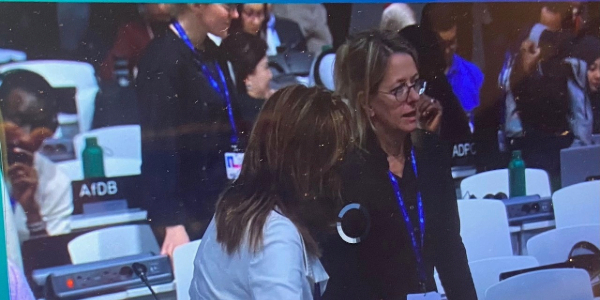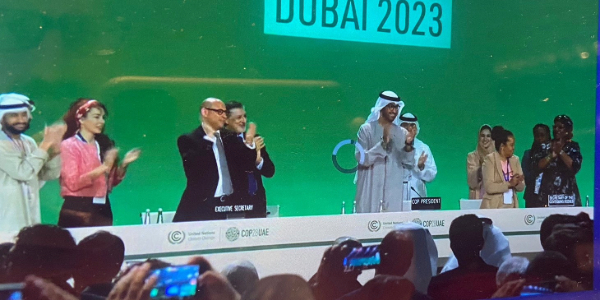COP 28: A Disappointing Outcome for the Phase Out of Fossil Fuels or a Promising Start to the End of the Fossil Fuel Era?
By Francesco Sindico - posted on 16 December 2023
I am writing this short piece just a few minutes before the final plenary of COP 28 starts in Dubai (10:30 AM Dubai time on 13 December 2023). As often happens, the COP is overrunning, but this time it feels a little different. There is a sense amongst observers (like me) and possibly country delegates and negotiators that this COP needs to deliver even more than in the past. Every year that passes, every percentage of temperature that increases, we are getting closer to a daunting tipping point in the climate crisis. The sense of urgency is palpable, or so it should be.
Whilst I wait to see if the COP delivers or not, associated questions come to mind: what has happened in relation to the key negotiations in Dubai, and why do we not yet have a final positive outcome, and what would that even look like? As a reminder, mainly for media and politicians, COPs do not create new legally binding treaties, or at least not always. Just like in Glasgow delegates were not there to negotiate a Glasgow Agreement, the same is true in Dubai. There is no Dubai legally binding agreement on the table, there never was. The last treaty negotiated by many of those same delegates ready for their final plenary was the Paris Agreement concluded in 2015. In a way, all the COPs after that date have been about implementing the Paris Agreement and accelerating climate action. This is not to say that they are not important and that every word is not fought for, but it is important to remind us that a COP Decision is not a treaty and is not legally binding in the same way. It does, however, set a direction of travel, which is then (sometimes) taken up by business and other relevant sectors.
Let us go back to what happened in Dubai. It all started (apparently) very well with the Decision on Loss and Damage adopted on Day 1. Clearly a lot of work had gone into this text before Dubai and parties were happy with the outcome. Loss and damage from climate change is not only now present in treaty language, it now also has a Fund to which many countries, starting with the UAE, have pledged money into. Scotland has been a front runner on loss and damage and climate justice, so this was a welcome development also from a home perspective.
However, without a positive outcome on the Global Stocktake, there still is a risk that Dubai will be remembered to be just the loss and damage COP. For the less versatile in international climate change law and policy, the Global Stocktake, as provided for in the Paris Agreement, is an exercise that takes place every five years to evaluate the efforts made by countries to implement their Nationally Determined Contributions (NDCs). The process lasted two years and concluded just before COP 28. In Dubai Parties were asked to deliver a COP Decision that, informed by the Global Stocktake, will steer the next set of NDCs in line with science. As a reminder, every country is under a legally binding obligation to submit an improved NDCs every five years, with the next ones scheduled for 2025. So this COP Decision is very important. What is (or is not) included in the Dubai COP Decision on the Global Stocktake will inform what will be included in the next iteration of NDCs, which ultimately will drive climate action both in the public and private sector.
So, whilst I see (on the screen) negotiators getting read to sit down for the final plenary, let us remind ourselves what has been the crux of the disagreement in the text of this important COP Decision.

Whilst the two year long process mentioned above evaluated all efforts made by Parties in relation to climate change, the real stumbling block is on what to do with our energy system and, in particular, what (if any) is the future of the fossil fuels’ world.
Over the two weeks of COP 28 there have been four versions of a Global Stocktake Decision circulated to parties with very different language on fossil fuels. The first one on 5 December looked actually quite promising. It was short and sweet with the first option on the table saying what many wanted to hear:
Calls upon Parties to take further action in this critical decade towards… An orderly and just phase out of fossil fuel
Whilst there was a third option, which was “no text”, the first one seemed almost too good to be true.
A second version of the text on 8 December got even better, with an option retaining the phasing out language and complementing it with references to science, the 1.5 C temperature goal and the Paris Agreement:
Calls upon Parties to take further action in this critical decade towards… Phasing out of fossil fuels in line with best available science, the IPCC’s 1.5 pathways and the principles and provisions of the Paris Agreement
Fast forward to December 11, and a new third version was released. A very different version. A smorgasbord of options was laid before Parties and let us just say that not many liked what was on offer.
Also recognizes the need for deep, rapid and sustained reductions in GHG emissions and calls upon Parties to take actions that could include, inter alia… Rapidly phasing down unabated coal and limitations on permitting new and unabated coal power generation… Reducing both consumption and production of fossil fuels, in a just, orderly and equitable manner so as to achieve net zero by, before, or around 2050 in keeping with the science
This text was released around 17:30 on December 11. It took the Presidency 36 hours to come up with a fourth version released around 07 AM on December 13. This version is the result of what I can only think were very intense negotiations between all the Parties mediated as best they could by the COP Presidency. The language now on the table, where we landed, so to speak, is the following:
Further recognizes the need for deep, rapid and sustained reductions in greenhouse gas emissions in line with 1.5 °C pathways and calls on Parties to contribute to the following global efforts, in a nationally determined manner, taking into account the Paris Agreement and their different national circumstances, pathways and approaches: Accelerating efforts towards the phase-down of unabated coal power;… Transitioning away from fossil fuels in energy systems, in a just, orderly and equitable manner, accelerating action in this critical decade, so as to achieve net zero by 2050 in keeping with the science
It is now almost 11 AM in Dubai and the final COP MOP Plenary will take place where Parties will decide whether to go or not with this fourth option. Let the drumroll begin, but before let us compare the different versions negotiated by the Parties and presented by the Presidency throughout COP 28.
|
|
Dec 5 (good) |
Dec 8 (almost too good too be true) |
Dec 11 (caused an outcry) |
Dec 13 (adopted) |
|
Introductory text |
“Calls upon Parties to take further action in this critical decade towards…
|
“Calls upon Parties to take further action in this critical decade towards… |
“Also recognizes the need for deep, rapid and sustained reductions in GHG emissions and calls upon Parties to take actions that could include, inter alia…
|
“Further recognizes the need for deep, rapid and sustained reductions in greenhouse gas emissions in line with 1.5 °C pathways and calls on Parties to contribute to the following global efforts, in a nationally determined manner, taking into account the Paris Agreement and their different national circumstances, pathways and approaches:
|
|
Core text |
An orderly and just phase out of fossil fuel” |
Phasing out of fossil fuels in line with best available science, the IPCC’s 1.5 pathways and the principles and provisions of the Paris Agreement.”
|
Rapidly phasing down unabated coal and limitations on permitting new and unabated coal power generation…
Reducing both consumption and production of fossil fuels, in a just, orderly and equitable manner so as to achieve net zero by, before, or around 2050 in keeping with the science”. |
Accelerating efforts towards the phase-down of unabated coal power;…
Transitioning away from fossil fuels in energy systems, in a just, orderly and equitable manner, accelerating action in this critical decade, so as to achieve net zero by 2050 in keeping with the science;” |
At 11:15 AM on December 13 the COP Decision was adopted.

So, where does this leave us when it comes to fossil fuels? Will COP 28 be remembered as a disappointing outcome for their phase out, or a promising start to the end of the fossil fuel era? It very much depends which of the four versions of the Global Stocktake you wish to compare with the final outcome. If you compare it with the earlier versions, one can conclude that COP 28 was a disappointment. If you compare it with the 11 December option, COP 28 starts to look as a promising start of a new phase of the global fight against climate change. Considering the (fossil fuel) nature of the host country, and the visible tension and disappointment in the rooms after the release of the 11 December version, the final outcome should be seen as something that countries can build on going forward.
This piece was finalised upon my return from COP 28 in Dubai, which I attended as part of the University of Strathclyde with generous support from the International Union for the Conservation of Nature (IUCN) World Commission on Environmental Law.